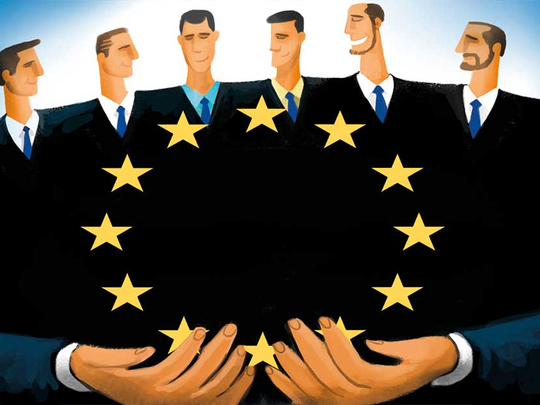
The celebration of the birth anniversary of European integration is a good opportunity to reflect on its most important achievements, including the establishment of relations with the Gulf oil producers.
The post-Second World War global configuration saw the emergence of the United States as the new economic, political and military power, with both financial strength, and manufacturing export capacity.
With a four-year financial aid package for stimulating the reconstruction and economic recovery of a war-ravaged Europe, the US-sponsored Marshall Plan encouraged cooperation between victorious and vanquished powers in Europe.
The placing of the machinery for crucial heavy industries of coal and steel (under common control by the European Coal and Steel Community (ECSC) soon proved to be a stepping stone for closer (voluntary) economic integration between sovereign countries acting and deciding commonly upon supranational instead of intergovernmental lines.
Inspired by their first, common initiative, Belgium, France, West Germany, Italy, Luxembourg and the Netherlands decided to further advance their unprecedented project of market integration by establishing the European Economic Community (EEC).
With the adopted idea to establish the European Atomic Energy Community (EAEC), at the end of the 1950s it became possible to say that almost all aspects of the economies of the six member states had become a matter of common, community concern.
Accomplishing steady expansion, balanced trade, fair competition, increasing the standard of living of the working population, and thereby strengthen the unity of their economies, were the main socio-economic objectives written in the founding legal instruments of the 1950s, the Treaty of Paris and the Treaty of Rome.
With the removal of the last obstacles still hampering the free movement of goods, persons, services and capital, the upon a trade in goods covering customs union built common market of the 1960s, which had become subject to stagnation and disintegration due to the economic recession years of the 1970s and the 1980s, became resolutely transformed in a smooth functioning, fully internal border-free single market by the end of 1992.
A single unit of payment and account under the management of an independent European central bank, monetary unification became a reality in the Eurozone participating member states of what in the meantime had become known as the European Union (EU).
Governed by common policies (e.g. agriculture, competition, energy, industry, trade etc.) a steadily growing membership — but cautious about common foreign affairs and hard, military security matters — an evolving EU developed a knowledge-intensive, high-tech manufacturing and services industries-driven multi-sector economy.
This situation is remarkable in that European recovery after the Second World War was first a matter of rebuilding the ruined infrastructures of heavy industries followed by a situation of catching up with technological change, product innovation and new methods of industrial manufacturing and product marketing, areas wherein the Americans and later the Japanese were having the overall excellence.
Thus, financially and ideologically encouraged by the US in the late 1940s, the relationship shifted from initially being one of client-patron to one marked by equality and interdependence. A previously needy and disadvantaged Europe is today no longer economically dependent on the US as it once was. Having acquired a leading position in world trade — thanks to its autonomous common commercial policy — the EU established many relationships with third countries and other regional integration blocs.
An Arab-Euro dialogue with the Gulf and other Middle Eastern oil producers began shortly after the first oil shock in 1973, but failed to take root meaningfully in view of the unexpected oil price hike and the largely unanticipated disruptions in oil supply.
Recognising the vast economic and financial potential, in addition to the presence of vested interests in their immense oil-and-gas deposits, relations with the Gulf Cooperation Council (GCC) states began in the late 1980s, with a GCC-EU cooperation agreement. A proposed association agreement with EU countries sharing sea-borders with Syria, came into effect after the latter was mired in an atrocious civil war.
AT the same time, the implementation of a partnership and cooperation agreement with Iraq remains difficult as long as sectarian violence and the terror of Daesh (the self-proclaimed Islamic State of Iraq and the Levant) continue to have a hold on the country.
But the lifting of all economic and financial sanctions from Iran, following the nuclear agreement between Tehran and the P5+1 (United States, Britain, France, China, Russia plus Germany), means that a current rapprochement between Brussels and Tehran may eventually lead to a re-engagement for trade and cooperation — something that had been stalled since 2005.
While the projected trade deal between the two regional blocs has remained elusive since 2008, the GCC states have expressed an eagerness to institutionalise their relations with the United Kingdom, the moment the country re-possesses full autonomy over the conduct of its external commercial relations post Brexit. Nevertheless, it is obvious that mutual economic interests and shared concerns over looming terrorism and challenges in hard, military security will remain binding factors in the relationship between the GCC and EU.
No doubt, 60 years of European integration is remarkable and laudable, and certainly deserves to be celebrated today.
But amid emerging calls for (trade) protectionism, in addition to a climate of rising populism in some EU member-states, it should be remembered that the EU will only continue to be successful if the project remains loyal to its first-hour spirits of solidarity among members and unity through peace.
Johann Weick is an expert in international trade policy and specialist in GCC-EU relations.









